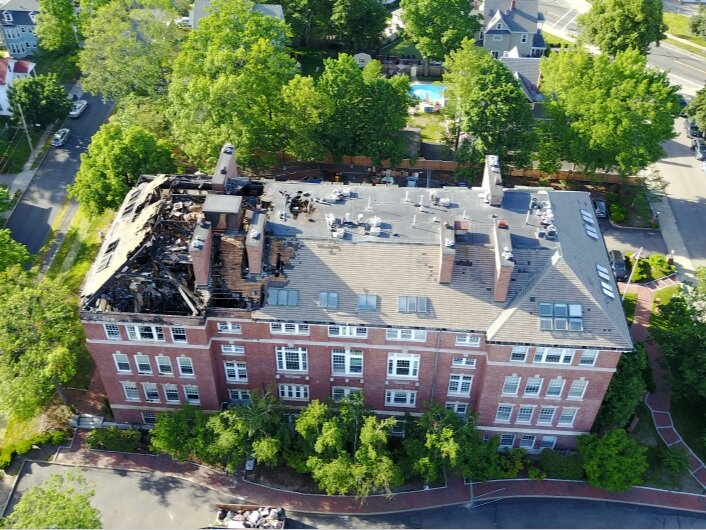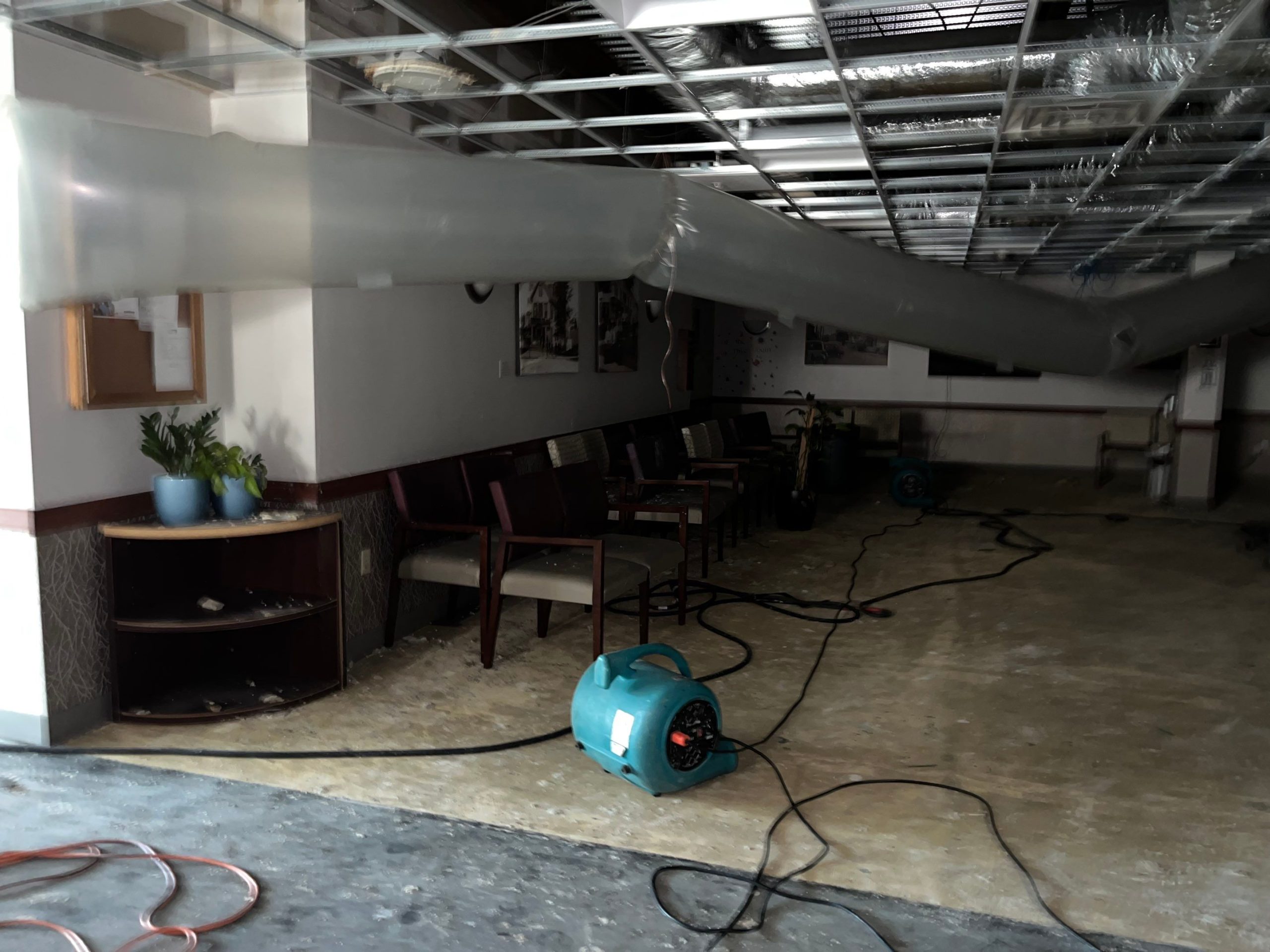With more than 20 years of experience in property management, Scott Wolf is an expert in meeting the needs of a condominium community. His company, Brigs LLC, is the premier full-service property management company in the Northeast. They’ve seen just about every kind of property disaster, and they know how to minimize disruption for their residents after a catastrophic loss.
In June 2017, a 7-alarm fire ripped through a Brigs-managed condo building in Reading, Mass. The fire destroyed most of the 40 units and compromised the entire four-story structure. Scott quickly went to work.
The Monday after the fire, he gathered his entire Brigs team together for an impromptu morning meeting; attendance was non-negotiable. “Look around you,” he said to the team. “What do you have with you right now – at this very moment? Do you have your car keys with you? Your phone charger? Do you have an extra set of clothes? What if the things you have with you right now are all you will have for the foreseeable future?”
Scott went on to explain that their clients – the residents of the burnt-out Reading condo building – were in exactly that situation. These people just lost their homes, they were emotionally destroyed, and they were going to be calling Brigs to ask a lot of questions. “Remember that,” he stressed to his team. “When these people call and yell, and make demands – treat them with respect, and compassion, and do all you can do to help them.”
That set the tone for the Brigs team. They were ready to help, and they had a big job ahead of them. It’s a good thing, too, because Scott and his team had their work cut out for them. Not just dealing with emotionally overwrought condo clients – Scott also had to manage a rebuild and simultaneously navigate the complex insurance claims process.
Three years later, with condo owners now comfortably resettled into their units, Scott can share his views on what went right through the long process – and what advice he can provide to other property managers after a catastrophic loss.
Communicate
The insurance process basically begins as soon as the fire is extinguished. The property manager is tasked with getting the building restored AND coordinating with unit owners – this involves insurance, town permits and codes, contractors, etc. The only thing you can directly control is communications. Scott recommends that property managers maintain both daily and weekly communications with unit owners. Sometimes it’s hard to stay in touch, especially when owners are living elsewhere, but it’s worth the effort. “Communications made a huge difference in Reading,” Scott says.
Get the Right Professionals in Place
Rebuilding is an incredibly difficult process, and building a team of contractors – architects, general contractors, insurance experts, etc. – is essential. Scott emphasizes the value of condo boards doing their due diligence when lining up all contractors. The most obvious early step is selecting an architect and general contractor to handle the construction work, but don’t forget insurance, legal, and other areas of expertise you’ll need. Property managers can guide board members by providing the right information. In Reading, Scott arranged for 6 architects and general contractors to look at and bid for the rebuild job. The board received proposals from each of the 6, and vetted each. Scott also contracted with a public adjuster to handle insurance matters, and insisted that outside counsel be brought in to review all construction proposals from a legal perspective.
Pick Professionals Based on Expertise – Not Price
One bit of advice in selecting the right contractors: Do not focus only on price! Scott says boards should think about the expected working relationship, as well. Scott recommends property managers take on the role of “contractor coordinator” to make sure the board checks references and personally interviews each architect and GC. He had the board review every portfolio to see what else the contractors had done – this ensured each company was suitable to help their own situation. Two of their finalists, for example, had renovated old schoolhouses, while a third had done major fire projects. Such projects, directly applicable and identified through Scott’s thorough vetting process, distinguished these contractors from the ones who had not retrofitted an existing building.
Manage Expectations
It’s important to appreciate where the board and unit owners are coming from – they are out of their homes, and they want to know construction started yesterday. Where are the trucks? Where are the workers? They will constantly want to see activity. And yet, they have to understand that this process is long. The Reading fire was on June 1, 2017, and it wasn’t until the following February (2018) that the first hammer was swung on roof repairs and other Phase I reconstruction work. Actual repair work to the building didn’t commence until October of 2018. Make sure everybody realizes from the outset that a property loss of this magnitude might mean that it will be 2-3 years before they’re home again.
Balancing Demands from the Board
Any seasoned property manager should have some skill at balancing board demands against what’s actually financially and logistically achievable. This is even harder after a big property loss. When the condo board wants to do something and you know better, the first thing you should do is put it in writing. Second, just point to facts. Focus on the details that are right in front of you. It’s not personal – and, ultimately, it’s not the property manager’s decision. The property manager should be factual and detailed, without bringing a personal opinion into the process. Give the best advice you can based on hard facts, even (sometimes especially) when it’s not what the board wants to hear.
Know Your Assets
First off, says Scott, you make allies by showing respect. Early on, the chief of the Reading Fire Department proved to be an invaluable ally to Brigs. Scott worked closely with him in helping the town building inspector achieve a level of comfort with an expedited reconstruction. The chief’s support was critical from early on; when the building inspector shut down access to the building, and Scott had to scramble to help unit owners get into their condos to get medication and other indispensable items. Town officials may not have direct experience with a catastrophic loss – it’s not every day that a 40-unit building has to be vacated for 2-3 years – and their inclination will be to shield themselves from mistakes. Just consider everybody’s perspective, treat all with respect, and forge alliances with agreeable officials to move things along.
Love Thy Neighbor
Community is huge in making things easier, and local relationships are key. Scott was lucky enough to establish a positive relationship with the condo’s neighbor across the street, a local church. This neighbor was gracious enough to give condo owners access to bathrooms and other amenities. Scott was over there so much his team joked that he was a church employee. Local businesses are also good allies. The Reading Cooperative Bank set up a GoFundMe campaign and held a fundraiser for the condo, which brought in some useful funds that were distributed equally between owners. There was also a charity hockey game and clothing donations that reflected the spirit of the community coming out in support of the condo owners and their plight.
Stay tuned for Part 2: Lessons Learned




